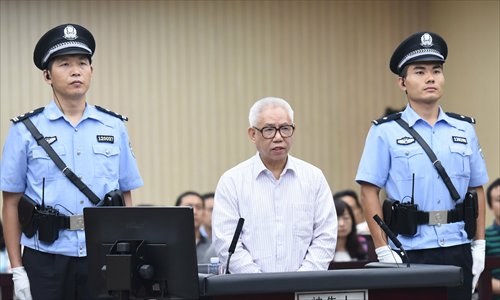HOME >> CHINA
Media room set up for reporters to receive details of sensitive case
Source:Global Times Published: 2016/8/4 19:23:39

Hu Shigen, leader of an underground church, was sentenced to over seven years in prison after being convicted of subverting State power Wednesday. Photo: Xinhua
As Hu Shigen, the leader of an underground church, was convicted of subverting State power on Wednesday by a Tianjin court, details of the trial were freely reported by the foreign media.Hu, 61, received a sentence of seven and a half years in prison and he said he would not appeal, according to a statement released by the Tianjin No. 2 Intermediate People's Court on its official Sina Weibo account on Wednesday.
The court also released five transcripts of the trial on its Weibo account, the first coming an hour after proceedings began at 8:30 am, together with photos of the trial.
The court adjourned at around 10:30 am after Hu asked to take his medicine and restarted after confirming Hu's health condition.
The details of the trial were released in real time through text and photos on a screen set up in a special media room at a nearby hotel. Journalists who did not manage to get a seat in the public gallery were invited to the center to report, the Tianjin Daily reported Thursday.
Major media outlets from the US, the UK, Spain, Japan and Qatar arrived in Tianjin to report on the trial, while five media organizations won the chance to sit in the public gallery.
At first, many foreign reporters did not believe they could get juicy information at the media center, and some sent their assistants to check it out first, staff members working in the media room told the Tianjin Daily.
However, after their assistants found it was easy to shoot and conduct interviews in the room, the foreign reporters went there and even encouraged other journalists to join them, said a staff member at the media center.
"We have demanded a civilized and friendly attitude toward foreigners when they interview people and observe, in addition to the inspections required by laws and regulations," Xu Xinhao, head of the Exit and Entry Administration Office of the Tianjin Municipal Public Security Bureau, told the Tianjin Daily.
Xu added that the bureau's officers are required to take an active approach to serving the needs of reporters but they are not allowed to interfere with their work or other activities.
A total of 48 people, including legislators, and political advisers, legal experts, lawyers and 20 journalists from across China and overseas, observed the trial.
Subversive acts
Hu is a native of Nanchang, capital of East China's Jiangxi Province. He was a teacher at a Beijing university before he began engaging in subversive activities.
Starting in 2009, Hu illicitly worked with lawyers and paid petitioners to spread subversive thoughts and ideas, said the court, adding that Hu also arranged for Gou Hongguo, another suspect, to receive anti-China training overseas.
"Some separatists seeking 'Tibet and Xinjiang independence' also took part in this 'leaders' camp' to learn anti-China theories and skills to confront the government and law enforcement agencies," Hu confessed.
The court also said Hu's coconspirators included Zhai Yanmin, who was sentenced to a 3-year suspended prison term after being found guilty of subverting State power on Tuesday.
With Hu's consent, Zhai organized gatherings in Qing'an county, Northeast China's Heilongjiang Province and incited others to stir up hatred for the government after a man was shot dead by local police at Qing'an railway station in May 2015.
Hu spread the rumor that the man had been murdered by police.
The China News Service reported that the man allegedly tried to stop other passengers from entering the station. He then grabbed and threw his young child at the police officer. While trying to snatch a gun from the officer, the policeman managed to fatally shoot him.
Follow-up investigations confirmed that the officer had acted within the law, the Xinhua News Agency reported.
"I just wanted to smear the judicial organs, police and government," confessed Hu, adding all these efforts were intended to promote his "peaceful transition" theory.
"Hu Shigen always talked about sensitive cases and the ways to hype them up," a witness surnamed Liu said in court.
"He wanted to use sensitive cases to trigger friction, put pressure on the government, overturn China's existing system and realize a 'color revolution' in China," Liu added.
Hu was imprisoned from 1994 to 2008 after he was convicted of inciting, organizing and leading "counterrevolutionary" activities, Xinhua reported.
Global Times
Newspaper headline: Transparent trial
RELATED ARTICLES:
Posted in: Law